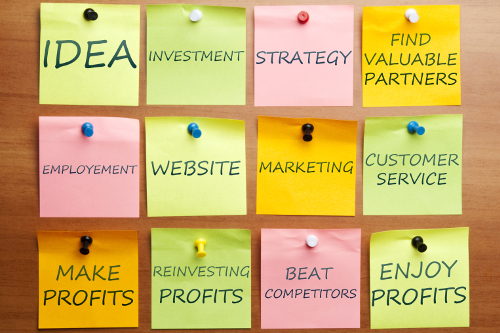There’s no guarantee of success when starting a business no matter how great the idea or passionate you are about what you have to offer.
In an interview with Sangeeta Badal, Ph.D., Senior Researcher, Entrepreneurship, at Gallup, the research firm shared their findings that approximately “50 percent of new U.S. companies fail in their first five years.”
Listed among the reasons for failure were factors like lack of funds, market changes, and regulatory requirements. One of the largest reasons from Gallup’s study though was the fact that the “entrepreneur just didn’t have the talent for the job.”
With these reasons in mind, it makes sense to pause, research, and consider some key factors that should not be overlooked when starting a business so as to not become another statistic related to business failure. It may also help to minimize that emotional roller coaster associated with starting a business.
Here are 10 factors to think about prior to jumping into the role of a business owner:
- Personal ability: While you may be willing to work night and day, week in and week out, it doesn’t always make up for the fact that you may lack the personal ability in terms of talent, knowledge, and skill. It may be hard to admit, but it’s important to do some personal reflection and even act a mentor or colleague for their assessment of your capabilities to run a business. While you can take classes and add skills, it cannot change the fact that maybe you are not as creative or as a big of a risk taker as is required to run a business. It’s okay if starting a business is not for you and does not mean you are a failure; all it says is that you should stick to growing your role in a company and climb that career ladder.
- Industry knowledge: It’s important to consider how much you actually know about the industry you are jumping into whether that be contracting, professional service, e-commerce, etc. If you have worked it in previously with other companies, you will have a better sense of the external environment like market conditions, trends, and overall understanding of the target audience. If you have never participated in a particular market segment of an industry, you will need to determine how much research it may take to ramp up your learning curve. Otherwise, you may not want to dip your toes in that industry pool.
- Potential risks: Every business is going to have a particular amount of risk but some have more than others. For example, some online businesses are considered so high risk like gaming, pharmaceuticals, auctions and international e-commerce that processing online payments associated with these businesses is either impossible or expensive. These types of risky businesses may also put you in very vulnerable state, especially considering you don’t have a lot of funds to get started. You could face lawsuits, penalties, and fees, so it’s critical that you review all the potential risks.
- Size and scope of target market: While you may initially think you have a huge target market of opportunity, you will need to do a more detailed analysis as to actual size and scope of the various segments that define your target market. Will these potential customers love your idea? Will they continue to buy in the future so you can sustain and grow your business? Are there future ways to grow your target audience? The answers to these questions will help you determine if you should start the business or not.
- Economic conditions: Local, national, and global economies experience different cycles of growth and recession. Depending on what you are selling and your target audience, it could be good to enter an economic cycle during growth or it might actually be feasible during a recession. This is because a recession doesn’t necessarily mean that no one is buying anything; it just may mean a different set of services and products that are desired based on economic standing. Understand what these economic cycles mean prior to starting a business so you don’t find yourself with little to no demand. Look at previous economic cycles to see what types of business fared well and see if you can align your idea with those segments. Otherwise, you may want to wait for the economic cycle to recalibrate.

- Your financial position and knowledge: Your own personal financial situation is critical to your business. First, it determines your ability to get credit or funding for your startup. Second, it shapes the type of financial decisions you make that can impact the health of your business. It’s important to be in a good financial standing so you can support yourself while you build out your business. If you have considerable debt or have made financial mistakes in the past, then you may want to wait on starting a business until you clear your financial standing and have improved your financial knowledge.
- Competition and ability to differentiate: If the market is already full of businesses that offer the same thing you will market, take the time to research the competition and determine if you can do anything to stand out in the crowded marketplace. Can you change the product or service to offer greater value for the target audience? When the market is already saturated and your business idea is not disruptive, it’s time to pursue something else.
- Location, location, location: It’s not just a term that is attributed to a real estate purchase. Businesses also must consider where they will set up shop. Will it be a physical location, online, or both? Will a pop-up shop periodically stimulate your online business? And, location is not just about where you will attract your audience because it’s also about proximity to those components of a supply chain that you may need, transportation and delivery of your offering, and talent that will help you run your business. Within your location decision, you must also consider how that geography deals with businesses in terms of taxation, compliance, and stimulus to help you grow.
- Timing in your personal life: While you may be passionate and seek a major change in career direction, it’s important to think about others in your life at this point of time, such as spouses and family members. Will the time and money you need to devote to starting a business impact upon their lives in a way that changes lifestyles? Are they okay with those changes? It’s important to consider your age and lifestyle preferences as well because you will need to determine if you are willing to give up nights and weekends or if you have the energy to go the distance with what can be a grueling experience. It helps to discuss this decision with a spouse who may need to return to work to support your dream.
- Plan B: It’s easy to just think your new business is going to take off than it is to have a fallback plan in case it doesn’t. In Plan B, you will need to determine a backup financial plan to cover your own personal expenses while your business takes time to grow. And, if for any reason the business were to fail, what would you do then for work and financial support? That’s why many small business owners have continued working at least part-time (and sometimes even full time) while they build their business.
Don’t let fear of these things happening stop you from starting a business. After all, it’s good to pursue your dreams plus startups and small businesses are integral in stimulating economies all over the world.
For example, Gallup’s World Poll has found that people want good quality jobs while a report from the World Bank concluded that the world needs 600 million new jobs to sustain economic and societal development across the globe.
You can help create those jobs as long as you carefully consider the aforementioned factors and adjust your strategy accordingly.
About the Author:
John Rampton is an entrepreneur, investor, online marketing guru and startup enthusiast. He is founder of the online invoicing company Due. John is best known as an entrepreneur and connector. He was recently named #2 on Top 50 Online Influencers in the World by Entrepreneur Magazine and a Blogging Expert by Time. He currently advises several companies in the San Francisco Bay area.
Save time shopping around for the best merchant service provider!
Call Leap Payments at (800) 993-6300 Today!
No Contracts Required, The Lowest Rates, No Hidden Fees, and Much More!



